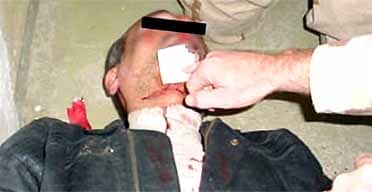Previously unpublished images showing US troops apparently abusing detainees at Iraq's Abu Ghraib prison in 2003 were broadcast today by an Australian television station.
Still and video images were broadcast on Dateline, a current affairs programme on SBS television, which appeared to show dead bodies and Iraqi prisoners being tortured by US troops.
In one piece of footage, an Iraqi detainee was seen slamming his head repeatedly into a metal door, with guards apparently unwilling to intervene and stop him.
A still image showed a naked detainee with 11 non-fatal gunshot wounds to his buttocks.
SBS said it had obtained a file of hundreds of images and that many of them depicted dead bodies, bloody injuries and acts of sexual humiliation that were too graphic to be aired.
In some of the film shown, naked male prisoners wearing hoods were seen being forced to masturbate in front of the camera.
The original photographs of abuse at Abu Ghraib caused worldwide outrage when they were leaked to US current affairs programme 60 Minutes in 2004. SBS said the new images were taken in late 2003 at around the same time as the previously publicised photographs, which included a series showing naked detainees arranged in "pyramids".
A number of the new images showed US soldiers who have already been convicted in military trials over the abuse scandal at the prison, including Private Lynndie England and Charles Graner.
It had been known that more images of the abuse at Abu Ghraib existed.
At a Senate committee inquiry in May 2004, the US secretary of defence, Donald Rumsfeld, said that not all known photographs of the abuses at Abu Ghraib had been publicly released. Mr Rumsfeld told the inquiry: "Beyond abuse of prisoners, there are other photos that depict incidents of physical violence toward prisoners, acts that can only be described as blatantly sadistic, cruel and inhuman."
Dateline's production team interviewed US Congress members who had been given a private viewing of all the images depicting abuse from Abu Ghraib, including those that had not been published in the media.
SBS refused to give details of the source of the photographs, but insisted it was confident of their credibility. It was impossible to independently confirm the images' authenticity.
Producers said the new images were among photographs the American Civil Liberties Union was trying to obtain from the US government under a freedom of information request.
In September last year, a US district court upheld the request in a ruling covering scores of photographs and several videotapes. Government lawyers responded by saying an appeal was being considered, and the images were not immediately released.
Speaking on Dateline's programme today, Amrit Singh, a lawyer for the the civil liberties union said she hoped the broadcast of the new images would provide pressure for high-ranking officials to be held accountable for "systematic and widespread abuse".
In total, seven low-ranking US personnel have been disciplined over the images. Graner, a reservist, received the highest sentence and was jailed for 10 years.
There were reports Washington was trying to prevent the new images being broadcast in the US.
The photographs were quickly picked up by Arabic television stations. It was feared they could add to tensions stirred up by the Danish cartoon row and Sunday's emergence of video showing British troops in Iraq apparently beating civilians in 2004.
British military police were today continuing to interview three British soldiers over a videotape obtained by the News of the World showing young Iraqis apparently being attacked in Amara, a town north of Basra, in January 2004.
The Royal Military Police arrested one person on Sunday night, and it detained two others yesterday as the investigation made "significant progress".
The first soldier arrested was named by the BBC as Corporal Martin Webster of the 1st Battalion, Light Infantry, although it was not clear whether he was being interviewed as a witness or a perpetrator.
